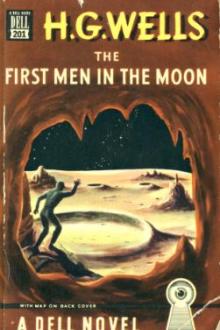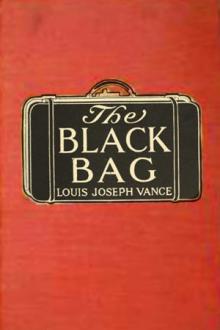The First Men in the Moon, H. G. Wells [romantic novels in english TXT] 📗

- Author: H. G. Wells
- Performer: -
Book online «The First Men in the Moon, H. G. Wells [romantic novels in english TXT] 📗». Author H. G. Wells
THE ASTONISHING COMMUNICATION OF MR. JULIUS WENDIGEE
When I had finished my account of my return to the earth at Littlestone I wrote, “The End,” made a flourish, and threw my pen aside, fully believing that the whole story of the First Men in the Moon was done. Not only had I done this, but I had placed my manuscript in the hands of a literary agent, had permitted it to be sold, had seen the greater portion of it appear in the Strand Magazine, and was setting to work again upon the scenario of the play I had commenced at Lympne before I realised that the end was not yet. And then, following me from Amalfi to Algiers, there reached me (it is now about six months ago) one of the most astounding communications I have ever been fated to receive. Briefly, it informed me that Mr. Julius Wendigee, a Dutch electrician, who has been experimenting with certain apparatus akin to the apparatus used by Mr. Tesla in America, in the hope of discovering some method of communication with Mars, was receiving day by day a curiously fragmentary message in English, which was indisputably emanating from Mr. Cavor in the moon.
At first I thought the thing was an elaborate practical joke by some one who had seen the manuscript of my narrative. I answered Mr. Wendigee jestingly, but he replied in a manner that put such suspicion altogether aside, and in a state of inconceivable excitement I hurried from Algiers to the little observatory upon the St. Gothard in which he was working. In the presence of his record and his appliances—and above all of the messages from Cavor that were coming to hand—my lingering doubts vanished. I decided at once to accept a proposal he made me to remain with him, assisting him to take down the record from day to day, and endeavouring with him to send a message back to the moon. Cavor, we learnt, was not only alive but free, in the midst of an almost inconceivable community of these ant-like beings, these ant-men, in the blue darkness of the lunar caves. He was lamed, it seemed, but otherwise in quite good health—in better health, he distinctly said, than he usually enjoyed on earth. He had had a fever, but it had left no bad effects. But curiously enough he seemed to be labouring under a conviction that I was either dead in the moon crater or lost in the deep of space.
His message began to be received by Mr. Wendigee when that gentleman was engaged in quite a different investigation. The reader will no doubt recall the little excitement that began the century, arising out of an announcement by Mr. Nikola Tesla, the American electrical celebrity, that he had received a message from Mars. His announcement renewed attention to a fact that had long been familiar to scientific people, namely: that from some unknown source in space, waves of electro-magnetic disturbance, entirely similar to those used by Signor Marconi for his wireless telegraphy, are constantly reaching the earth. Besides Mr. Tesla quite a number of other observers have been engaged in perfecting apparatus for receiving and recording these vibrations, though few would go so far as to consider them actual messages from some extra-terrestrial sender. Among that few, however, we must certainly count Mr. Wendigee. Ever since 1898 he had devoted himself almost entirely to this subject, and being a man of ample means he had erected an observatory on the flanks of Monte Rosa, in a position singularly adapted in every way for such observations.
My scientific attainments, I must admit, are not great, but so far as they enable me to judge, Mr. Wendigee’s contrivances for detecting and recording any disturbances in the electro-magnetic conditions of space are singularly original and ingenious. And by a happy combination of circumstances they were set up and in operation about two months before Cavor made his first attempt to call up the earth. Consequently we have fragments of his communication even from the beginning. Unhappily, they are only fragments, and the most momentous of all the things that he had to tell humanity—the instructions, that is, for the making of Cavorite, if, indeed, he ever transmitted them—have throbbed themselves away unrecorded into space. We never succeeded in getting a response back to Cavor. He was unable to tell, therefore, what we had received or what we had missed; nor, indeed, did he certainly know that any one on earth was really aware of his efforts to reach us. And the persistence he displayed in sending eighteen long descriptions of lunar affairs—as they would be if we had them complete—shows how much his mind must have turned back towards his native planet since he left it two years ago.
You can imagine how amazed Mr. Wendigee must have been when he discovered his record of electro-magnetic disturbances interlaced by Cavor’s straightforward English. Mr. Wendigee knew nothing of our wild journey moonward, and suddenly—this English out of the void!
It is well the reader should understand the conditions under which it would seem these messages were sent. Somewhere within the moon Cavor certainly had access for a time to a considerable amount of electrical apparatus, and it would seem he rigged up—perhaps furtively—a transmitting arrangement of the Marconi type. This he was able to operate at irregular intervals: sometimes for only half-an-hour or so, sometimes for three or four hours at a stretch. At these times he transmitted his earthward message, regardless of the fact that the relative position of the moon and points upon the earth’s surface is constantly altering. As a consequence of this and of the necessary imperfections of our recording instruments his communication comes and goes in our records in an extremely fitful manner; it becomes blurred; it “fades out” in a mysterious and altogether exasperating way. And added to this is the fact that he was not an expert operator; he had partly forgotten, or never completely mastered, the code in general use, and as he became fatigued he dropped words and misspelt in a curious manner.
Altogether we have probably lost quite half of the communications he made, and much we have is damaged, broken, and partly effaced. In the abstract that follows the reader must be prepared therefore for a considerable amount of break, hiatus, and change of topic. Mr. Wendigee and I are collaborating in a complete and annotated edition of the Cavor record, which we hope to publish, together with a detailed account of the instruments employed, beginning with the first volume in January next. That will be the full and scientific report, of which this is only the popular first transcript. But here we give at least sufficient to complete the story I have told, and to give the broad outlines of the state of that other world so near, so akin, and yet so dissimilar to our own.
AN ABSTRACT OF THE SIX MESSAGES FIRST RECEIVED FROM MR. CAVOR
The two earlier messages of Mr. Cavor may very well be reserved for that larger volume. They simply tell, with greater brevity and with a difference in several details that is interesting, but not of any vital importance, the bare facts of the making of the sphere and our departure from the world. Throughout, Cavor speaks of me as a man who is dead, but with a curious change of temper as he approaches our landing on the moon. “Poor Bedford,” he says of me, and “this poor young man”; and he blames himself for inducing a young man, “by no means well equipped for such adventures,” to leave a planet “on which he was indisputably fitted to succeed” on so precarious a mission. I think he underrates the part my energy and practical capacity played in bringing about the realisation of his theoretical sphere. “We arrived,” he says, with no more account of our passage through space than if we had made a journey of common occurrence in a railway train.
And then he becomes increasingly unfair to me. Unfair, indeed, to an extent I should not have expected in a man trained in the search for truth. Looking back over my previously written account of these things, I must insist that I have been altogether juster to Cavor than he has been to me. I have extenuated little and suppressed nothing. But his account is:—
“It speedily became apparent that the entire strangeness of our circumstances and surroundings—great loss of weight, attenuated but highly oxygenated air, consequent exaggeration of the results of muscular effort, rapid development of weird plants from obscure spores, lurid sky—was exciting my companion unduly. On the moon his character seemed to deteriorate. He became impulsive, rash, and quarrelsome. In a little while his folly in devouring some gigantic vesicles and his consequent intoxication led to our capture by the Selenites—before we had had the slightest opportunity of properly observing their ways....”
(He says, you observe, nothing of his own concession to these same “vesicles.”)
And he goes on from that point to say that “We came to a difficult passage with them, and Bedford mistaking certain gestures of theirs”—pretty gestures they were!—“gave way to a panic violence. He ran amuck, killed three, and perforce I had to flee with him after the outrage. Subsequently we fought with a number who endeavoured to bar our way, and slew seven or eight more. It says much for the tolerance of these beings that on my recapture I was not instantly slain. We made our way to the exterior and separated in the crater of our arrival, to increase our chances of recovering our sphere. But presently I came upon a body of Selenites, led by two who were curiously different, even in form, from any of those we had seen hitherto, with larger heads and smaller bodies, and much more elaborately wrapped about. And after evading them for some time I fell into a crevasse, cut my head rather badly and displaced my patella, and, finding crawling very painful, decided to surrender—if they would still permit me to do so. This they did, and, perceiving my helpless condition, carried me with them again into the moon. And of Bedford I have heard or seen nothing more, nor, so far as I can gather, has any Selenite. Either the night overtook him in the crater, or else, which is more probable, he found the sphere, and, desiring to steal a march upon me, made off with it—only, I fear, to find it uncontrollable, and to meet a more lingering fate in outer space.”
And with that Cavor dismisses me and goes on to more interesting topics. I dislike the idea of seeming to use my position as his editor to deflect his story in my own interest, but I am obliged to protest here against the turn he gives these occurrences. He says nothing about that gasping message on the blood-stained paper in which he told, or attempted to tell, a very different story. The dignified self-surrender is an altogether new view of the affair that has come to him, I must insist, since he began to feel secure among the lunar people; and as for the “stealing a march” conception, I am quite willing to let the reader decide between us on





Comments (0)